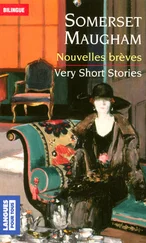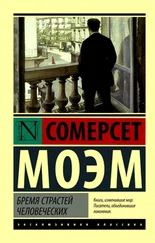| All round were little groups of students, talking and laughing; and here and there was a family, father and mother, a couple of sons and a girl; and sometimes the girl said a sharp thing, and the father leaned back in his chair and laughed, laughed heartily. |
Кругом сидели, болтая и смеясь, компании студентов, а за некоторыми столиками - целые семьи: отец, мать, сыновья и дочь; порою дочь отпускала острое словцо, и отец откидывался на стуле, хохоча от души. |
| It was very friendly and innocent. There was a pleasant homeliness in the scene, but for this Philip had no eyes. |
Все тут выглядело мило и безобидно, дышало каким-то домашним уютом, но Филип не замечал ничего вокруг. |
| His thoughts ran on the play he had just come from. |
Мысли его все еще были поглощены спектаклем. |
| "You do feel it's life, don't you?" he said excitedly. |
- Ведь это и есть жизнь, правда? - говорил он возбужденно. |
| "You know, I don't think I can stay here much longer. |
Знаете, я, кажется, не смогу здесь дольше оставаться. |
| I want to get to London so that I can really begin. |
Хочется уехать в Лондон и жить по-настоящему. |
| I want to have experiences. |
Хочется испытать все. |
| I'm so tired of preparing for life: I want to live it now." |
Мне так надоело готовиться к жизни - пора наконец начать жить. |
| Sometimes Hayward left Philip to go home by himself. |
Иногда Хейуорд предоставлял Филипу добираться до дому одному. |
| He would never exactly reply to Philip's eager questioning, but with a merry, rather stupid laugh, hinted at a romantic amour; he quoted a few lines of Rossetti, and once showed Philip a sonnet in which passion and purple, pessimism and pathos, were packed together on the subject of a young lady called Trude. |
Он никогда толком не отвечал на жадные расспросы Филипа, отделываясь глуповатым смешком и намекая на какую-то любовную интрижку; цитировал строчки Россетти и как-то показал Филипу сонет, в котором поминались страсть и багрец, меланхолия и пафос,- и все это посвящалось некой молодой даме по имени Труда. |
| Hayward surrounded his sordid and vulgar little adventures with a glow of poetry, and thought he touched hands with Pericles and Pheidias because to describe the object of his attentions he used the word hetaira instead of one of those, more blunt and apt, provided by the English language. |
Хейуорд любил окружать свои пошлые, незамысловатые похождения ореолом поэзии, воображая, будто ничем не уступает Периклу и Фидию, раз называет свою подружку греческим "hetaira" [*20], а не более грубым и точным английским словом. |
| Philip in the daytime had been led by curiosity to pass through the little street near the old bridge, with its neat white houses and green shutters, in which according to Hayward the Fraulein Trude lived; but the women, with brutal faces and painted cheeks, who came out of their doors and cried out to him, filled him with fear; and he fled in horror from the rough hands that sought to detain him. |
Однажды днем любопытство привело Филипа в переулок возле старого моста, застроенный опрятными белыми домиками с зелеными ставнями, где, по словам Хейуорда, жила его Труда; но из дверей выглядывали женщины с хищными лицами и накрашенными щеками и зазывали его. Филипа охватил страх, и он в ужасе бежал от их грубых и цепких объятий. |
| He yearned above all things for experience and felt himself ridiculous because at his age he had not enjoyed that which all fiction taught him was the most important thing in life; but he had the unfortunate gift of seeing things as they were, and the reality which was offered him differed too terribly from the ideal of his dreams. |
Ему так хотелось познать жизнь, что он чувствовал себя смешным, не испытав еще в свои годы того, что, как писали в книгах, было самым важным в человеческой жизни; но, обладая злосчастным даром видеть вещи такими, какие они есть, он отступал перед действительностью, которая так резко отличалась от его идеала. |
| He did not know how wide a country, arid and precipitous, must be crossed before the traveller through life comes to an acceptance of reality. |
Он еще не знал, какую бескрайнюю, каменистую, полную опасности пустыню приходится преодолеть путешественнику по жизни, прежде чем он придет к примирению с действительностью. |
| It is an illusion that youth is happy, an illusion of those who have lost it; but the young know they are wretched, for they are full of the truthless ideals which have been instilled into them, and each time they come in contact with the real they are bruised and wounded. |
Ведь это иллюзия, будто юность всегда счастлива,- иллюзия тех, кто давно расстался с юностью; молодые знают, сколько им приходится испытывать горя, ведь они полны ложных идеалов, внушенных им с детства, а придя в столкновение с реальностью, они чувствуют, как она бьет их и ранит. |
| It looks as if they were victims of a conspiracy; for the books they read, ideal by the necessity of selection, and the conversation of their elders, who look back upon the past through a rosy haze of forgetfulness, prepare them for an unreal life. |
Молодежи начинает казаться, что она стала жертвой какого-то заговора: книги, подобранные для них взрослыми, где все так идеализировано, разговоры со старшими, которые видят прошлое сквозь розовую дымку забвения,- все это готовит их к жизни, совсем не похожей на действительность. |
| They must discover for themselves that all they have read and all they have been told are lies, lies, lies; and each discovery is another nail driven into the body on the cross of life. |
Молодым приходится открывать самим, что все, о чем они читали и о чем им твердили,- ложь, ложь и ложь; а каждое такое открытие - еще один гвоздь, пронзающий юное тело, распятое на кресте человеческого существования. |
| The strange thing is that each one who has gone through that bitter disillusionment adds to it in his turn, unconsciously, by the power within him which is stronger than himself. |
Удивительнее всего, что тот, кто сам пережил горькое разочарование, в свою очередь, помимо воли, поддерживает лживые иллюзии у других. |
| The companionship of Hayward was the worst possible thing for Philip. |
Для Филипа не могло быть ничего вреднее дружбы с Хейуордом. |
| He was a man who saw nothing for himself, but only through a literary atmosphere, and he was dangerous because he had deceived himself into sincerity. |
Это был человек, который не видел жизни своими глазами, а постигал ее только через книги и был вдвойне опасен тем, что убедил себя в своей искренности. |
| He honestly mistook his sensuality for romantic emotion, his vacillation for the artistic temperament, and his idleness for philosophic calm. |
Он непритворно принимал свою похоть за возвышенные чувства, слабодушие - за непостоянство артистической натуры, лень - за философское спокойствие. |
| His mind, vulgar in its effort at refinement, saw everything a little larger than life size, with the outlines blurred, in a golden mist of sentimentality. |
Ум его, пошлый в своих потугах на утонченность, воспринимал все в чуть-чуть преувеличенном виде, расплывчато, сквозь позолоченный туман сентиментальности. |
| He lied and never knew that he lied, and when it was pointed out to him said that lies were beautiful. |
Он лгал, не зная, что лжет, а когда другие в этом его упрекали, говорил, что ложь прекрасна. |
| He was an idealist. |
Словом, он был идеалист. |
| XXX |
ГЛАВА 30 |
| Philip was restless and dissatisfied. |
Филип потерял покой. |

![Уильям Макгиверн - Завтра опять неизвестность [английский и русский параллельные тексты]](/books/35168/uilyam-makgivern-zavtra-opyat-neizvestnost-angli-thumb.webp)


